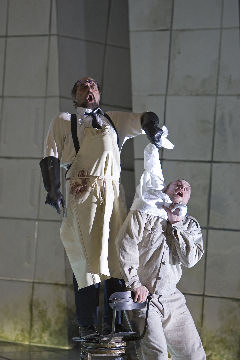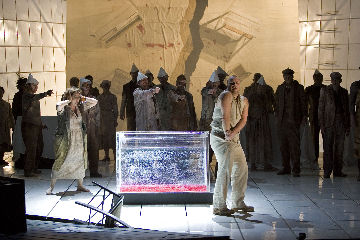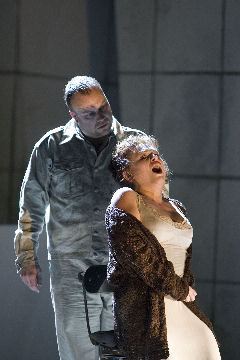|
Editor:
Marc Bridle
Webmaster: Len Mullenger
|
Seen and Heard Opera Review Berg, Wozzeck: soloists, Royal Opera Chorus and Orchestra, conducted by Daniel Harding. 2.3.2006. (JPr)
Director
: Keith
Warner
In 1935 Alban Berg, like Mahler almost a quarter of the century previously, died too early with a musical life that was unfulfilled. His first opera Wozzeck had been premièred in 1925 but a second Lulu remained unfinished at the time of his death. Berg was an early disciple of Gustav Mahler, and his widow Alma became a champion of Berg's compositions. So it is to her that Wozzeck is dedicated, and Alma underwrote Berg's printing of the score of this opera by Universal Edition. One of Berg's last compositions was his Violin Concerto written in memory of the death of young Manon Gropius, Alma's daughter by her second marriage.
This 2002 production of Wozzeck is revived at Covent Garden for the first time and remains a cold-hearted yet enthralling theatrical and musical event. The conductor, orchestra and set design (by Stefanos Lazaridis) were the real stars of the show but I sat through the entire evening (March 2) without having my emotions engaged apart from the occasional shocking depiction of colonic irrigation (or worse!) – that caused me to shift restlessly in my seat - and Wozzeck's ultimate suicide. The crux of the story is the humiliation and destruction of a simpleton who finally completely loses the plot and is driven to murder and then death at his own hands. Berg first saw this true morality tale as a straight play by Georg Büchner in 1914 and was inspired to write his opera. The director, Keith Warner's vision strips all the humanity and emotional simplicity from the piece mostly for mere artifice and effect.
Johan Reuter and Susan Bullock both
sing the central characters of Wozzeck and Marie with
great musical sensitivity. With other lesser interpreters
these pivotal roles might just be a succession of barks,
shrieks or yowls. However Susan Bullock is not as convincing
as his ‘tart with a heart’ as Katarina Dalayman was
in 2002. I never believed in her travails for one minute.
Although in superb voice she never gave her all to take
the risks that would create a real person. Also to see
her having her skirt lifted and succumb to the Drum
Major’s ‘charms’ was like hearing a quintessentially
English Rose swear for the first time.
Britain’s inhibitions about sex appears to extend to its singers (and actors).Those from other more enlightened countries appear to get ‘down and dirty’ more realistically. For
a British singer there is often a language barrier that
impedes their characterisation in this sort of music.
That is, unless you are someone like Graham Clark here
performing the Captain once again. He shares with Ms
Bullock a perfect clarity of diction for the German
but he is a proper ‘stage animal’ and he brings his
part to real life. Admittedly it seemed more than ever
a geriatric version of his Mime (his signature role)
but it was a pleasure to see him back at Covent
Garden once
again. He hobbles around on two walking sticks and constantly
bickers with the equally impressive evil doctor (or
Doctor Evil?) of Kurt Rydl. This is a gift of a part
for this veteran Austrian bass who is at his best when
portraying baleful malevolence. He spends most of his
big scene force-feeding beans to his victim.
Back to the Top Back to the Index Page |
| ||
|
||||





